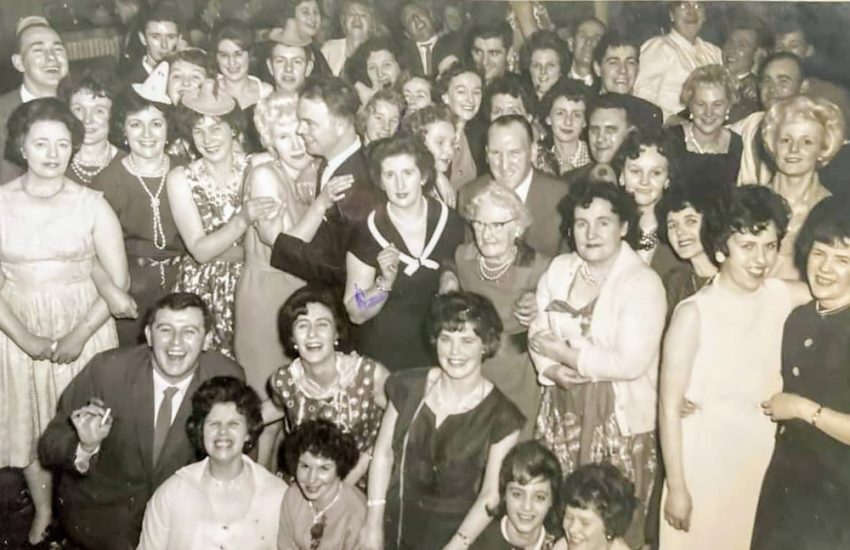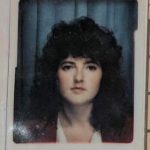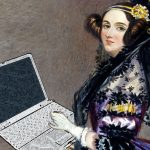Little did I know that my journey from secretarial training to computer scientist was the classic one women had been making since the first computer was built.
Ruth Stalker-Firth
My journey into computing began the day I was sitting in typing class in my final year at school when I was 15-years old. Each one of us girls sat in front of desk with a heavy manual typewriter that used to fold out of the desk and the teacher would shout: Hands on your home keys, girls. There were no boys in the class. We had to learn dictation and what-not so that we could become secretaries and help all the men communicate their important information and probably look nice whilst we did it.
I picked typing over computing as it was full of boys and growing up as I did with brothers and no sisters, it would be just another place where I’d have to work really hard to be included and never taken seriously. My eldest brother, who is six years old than me, was already a member of the working men’s club where women were not allowed in, though I did once get a job in the bar to see what went on in there. I was fired after three hours and told that my face didn’t fit. I think this was because on my first and only shift some dirty old man had come over to order a pint and say things, which to be honest I didn’t really understand, but must have been of an inappropriate nature judging by the leering and gurning he was doing. I guess my face let him know exactly what I thought of him as another barmaid humoured him and told me after I had to be friendly. I guess my face wasn’t impressed by her either.
But back to typing class, when the teacher’s back was turned, one of the girls would swing the long blinds and hit me in the back of the neck with them. It was only when another girl one said: Oooh this will be us next year all in a line at the factory, I’ve already put my name down, that I looked up to see the expression on this girl’s face (happy or not?) and saw the first girl was swinging the blinds to hit me on purpose. I got super-stressed thinking about how my mother was going to get really, really angry with me that evening if I mentioned any of this.
My mam left school at 14 to work in one of many factories over the years making buttons, pyjamas, cakes at Welford’s bakery and so on. (The picture at the top of the blog is one of a Welford’s Bakery Christmas Party, Middlesbrough, in the 1950s. © Facebook group Friends of Eston). She said that the work was super boring but could be a bit of laugh if the people you worked with were fun. She would finish each anecdote with: I hope you don’t end up working in a factory and go on to say she wanted something better for me. She also wanted a better me. I was, to her, an irritating child who could never stand up for myself so she would put me outside saying I had to hit the kids who’d hit me first otherwise I’d get no tea. Consequently, there was no way on earth I could ever go home and say I let someone hit me with the blinds in typing, interrupt my learning and possibly my chances of getting a better job in an office.
All wobbly, I had to tell this girl to stop hitting me. She didn’t. Channelling my very scary mother, I told the girl that I would wait for her after class and then she’d see how funny it would be when I hit her really, really hard. Of course true to form, my inner child, who was already crying buckets, and I, spent the rest of the lesson bricking myself in case I had to have a fight.
I passed my ‘CSE’ in typing but failed the special secretarial level, which is just as well, my face probably wouldn’t have behaved well with some man dictating at it. Though, I can type super fast which has gotten me through many computing coursework deadlines over the years.
On leaving school, I got a job in the local supermarket on a night and weekends and went to Sixth Form College to study English Literature just like Julie Walters in Educating Rita. At the time, there was a squeeze on liberal arts funding for university places, rather like nowadays with all that cyber talk, and I needed three ‘A’s at ‘A’ level to get in. I didn’t get that high so I tootled off to Liverpool Polytechnic which became LJMU so that I graduated from a university with a 2.1 in Computing, despite starting out not even knowing how to switch on a computer. Little did I know that my journey from secretarial training to computer scientist was a classic journey women had been making since the first computer was built.
I loved computing and only once regretted the switch from English to Computing. There in a minority of about eight women to ninety men, I learnt von Neumann architecture, how compilers worked, how to code, how to script, how to build computer networks, how to perform systems analysis, how to design good code with software engineering, do modelling data analysis, and build databases, and so on.
Not once did anyone ever mention Grace Hopper who invented COBOL and compilers so that code could become independent of the machine on which it was written, or Margaret Hamilton inventor of software engineering, or Katherine Johnson, Dorothy Vaughan, and Mary Jackson, African-American scientists at NASA who suffered both sexism and racism as they did coding and engineering and made space history as their work got American astronaut John Glenn into space and circulating the earth. Or any of the very many stories about the women who advanced the field of computers.
As the stories weren’t told, I guess I just assumed, like the rest of life from the Bible to the movies, it had always been predominantly male and I was completely unimportant without a contribution to make. Unlike my girls, it never even occurred to me to ask: Where are all the women’s stories? And, the only story I ever heard about a woman in computing was the one I found myself (in the library, before the WWW!) when I decided to learn ADA to code up my final year project and discovered it was named after Ada Lovelace, Countess of Byron, who first came up with the idea of coding and loops to calculate things that men hadn’t already calculated.
I went into computing on a whim, but if I’d had a choice, I never would have chosen it either, because I didn’t think it had anything to do with me. It was a man’s world without women and unappealing to women, as I’ve said because it has as no role models, no stories, no tribes, no rewards, no equal pay, and no respect for women.
I remain optimistic that this will change. However…
The government has spent millions of pounds on trying to encourage women to go into STEM subjects. They should instead spend that money on telling the story of when computers were women.
Dr Ruth Stalker-Firth
For when they do that, we will create a place and space in which women can thrive and make it more inviting for future generations of women.
I hope to see you there!







4 comments